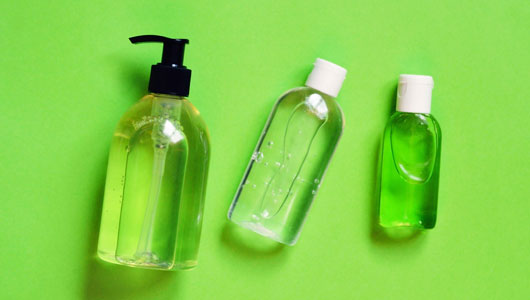
Lube Ingredients
When it comes to choosing a lube, it's important to know what's in it. Some of us want an all-natural lube, others want to avoid allergens, and others don't care as long as it works/lasts/tastes good!
In this guide, I'll take an in-depth look at the most common lube ingredients. I'll talk about what they do, how they feel, and which kind of lube they're used for. I'll also tell you which are the safest and reveal the one ingredient you should never use for any kind of play.
Common Lube Ingredients
Aloe vera: natural, hypoallergenic glide
Aloe vera, also referred to as aloe barbadensis, is a smooth, soothing gel from the aloe vera plant. Known for its soothing properties, aloe offers a slippery glide that reduces friction and irritation. Many aloe-based lubes contain other beneficial botanicals like chamomile and calendula extracts.
Because aloe vera is a renewable resource that needs minimal processing, it's more sustainable than some lube ingredients. Most aloe-based lubes do not contain any animal-derived products, making them a good choice for vegans and vegetarians.
Sensitive to lubricants? Read more about sensitive skin lube
Benzocaine: numbing agent, not safe for lube
Benzocaine is a local anesthetic commonly found in over-the-counter products for cold sores and insect bites. Benzocaine works by temporarily blocking nerve signals in the skin, reducing sensitivity. This ingredient is common in anal lubes that are designed to reduce discomfort and make anal play more pleasurable.
Benzocaine and other numbing agents like lidocaine should not be used during play of any kind. Pain is a sign to slow down, change positions, add more lube, or stop. Benzocaine can keep you from feeling important signals from your body. It can also cause itching, inflammation, and rashes. Benzocaine is not safe to use in large doses, as it can enter the bloodstream and cause dangerous systemic reactions.
Capsaicin: safe to use in warming lubes
Capsaicin, a chemical compound sourced from chili peppers that gives them their fiery zing, is a common ingredient in warming lubes. When added to personal lubricants, it creates a warming sensation that can help increase blood flow and heighten sensitivity.
Before using capsaicin-infused lube during sex, it's important to test a small patch of skin for sensitivity or allergic reactions. If you're interested in trying out personal lubricants with capsaicin, check out this list of the best warming lubricants.
Learn more: Warming Lube
Carrageenan: safe plant-derived thickener
Carrageenan is a natural product derived from red seaweed. It acts as a natural thickening agent in many water-based lubes. Its gel-like texture provides long-lasting glide without a sticky or greasy feeling. Carrageenan is also used as a thickener in foods like ice cream and plant milk.
Cellulose gum: safe plant-derived thickener
Cellulose gum, also known as carboxymethylcellulose or CMC, is a plant-derived ingredient used to control the thickness and viscosity of lubricant. It's common in water-based lubes and is considered safe for use on sensitive skin.
Cyclopentasiloxane: fairly safe silicone
You'll find this silicone compound in many silicone-based lubricants. Cyclopentasiloxane gets a fair rating from the Environmental Working Group, which describes it as a low risk for allergies and toxicity of the immune system and reproductive tract.
Learn more: Water-Based Vs. Silicone Lube
Deionized water: safe H2O
Water contains positive and negative ions that can be considered impurities when the water is used an ingredient in a lube or other product. Deionized water has had the ions removed, making it purer.
Diazolidinyl urea: a potentially irritating preservative
Diazolidinyl urea is a synthetic preservative used in cosmetics, personal care products, and lubricant. It works by releasing formaldehyde, which prevents the growth of bacteria and other microorganisms. Some people may be sensitive to formaldehyde and might experience allergic reactions or irritation from products containing diazolidinyl urea.
Dimethiconol: fairly safe silicone
Dimethiconol is a type of silicone gum used in products such as hair conditioners, moisturizers, and silicone-based lubes. Like most silicones, dimethiconol is safe for the majority of people but can cause skin irritation if you're sensitive.
Not sure which lube is right for you? Read How To Choose A Lube
Dimethicone, or PEG 8: fairly safe silicone
Dimethicone is a type of silicone used in silicone-base and hybrid lubes. It repels water, making it a good choice for bath and shower play. Dimethicone is hypoallergenic, non-comedogenic, and generally considered safe for use in lubricants.
Browse all silicone lubes
Gluconolactone: a safer preservative
Gluconolactone is a naturally occurring polyhydroxy acid (PHA) that has gained popularity as an alternative to parabens in personal lubricants. This ingredient acts as both a humectant and antioxidant, providing moisturizing benefits while also protecting the product from spoiling. Because gluconolactone is gentle, it's safe for sensitive skin and mucous membranes.
Glycerin: may disrupt vaginal pH
Glycerin attracts moisture from the air and helps to maintain hydration levels on the skin's surface. This ingredient is used in lube to add a smooth, slippery texture. Because glycerin is a sugar derivative, it can disrupt the vaginal pH balance and cause yeast infections, itching, and irritation.
Learn more: How To Use Lube
Hydroxyethylcellulose
Hydroxyethylcellulose (HEC) is another plant-based ingredient that acts as a thickening agent in water-based lubricants. HEC provides a smooth texture without causing irritation or discomfort during intimate activities.
Lidocaine: numbing agent, not safe for lube
Like benzocaine, lidocaine is an anesthetic added to certain lubes to block pain signals. As a numbing agent, lidocaine is not safe to use during intercourse of any kind, particularly anal intercourse.
Learn more: How To Prepare For Anal Sex
Menthol: safe in cooling or warming lubes
Menthol is an organic compound derived from the mint plant and known for its cooling properties when applied to the skin. In cooling or warming lubes, menthol delivers a stimulating coolness and tingling sensation. Like capsaicin lubes, menthol lubes should be patch-tested on the skin before being used on the genitals.
Methylisothiazolinone: a potentially irritating preservative
Methylisothiazolinone (MIT) is a preservative commonly found in water-based lubes. Though it doesn't carry the same risks associated with parabens, which are chemical preservatives, MIT can potentially cause irritation or allergic reactions. To avoid MIT, look for lubes with preservatives that are use plant-based and hypoallergenic.
Nonoxynol-9 spermicide: a potentially irritating spermicide
Nonoxynol-9 is sometimes added to lubes for contraceptive purposes, but is associated with a higher likelihood of irritation, pH imbalance, and yeast infections. Adding nonoxynol-9 to lubes can also disrupt the vaginal barrier, raising the risk of STIs.
Unless you depend on this ingredient as a contraceptive, avoid it in lubes if possible.
Oils: body-safe, long-lasting glide
Lubricants containing natural plant oils oil like coconut, safflower, and almond oils are smooth, long-lasting, and stand up to water. They're great for anal play and are some of the least irritating lube ingredients on our list. They also contain essential fatty acids that can help maintain healthy skin and improve skin elasticity.
The downside of oils? They can damage plastic sex toys and are typically not safe for use with condoms.
Parabens: potentially risky preservatives
Parabens are chemical preservatives that are associated with skin irritation, yeast infection, or reactions like swelling and itching. They may also act like estogens in the body, leading to hormonal imbalances and potential health effects, including an increased risk of breast cancer.
Petroleum-based products: potentially toxic
These ingredients are not compatible with latex condoms and may damage sex toys made from silicone materials. They can also trap bacteria within their greasy texture, leading to potential infections. Petroleum products can be safe when refined correctly, but may contain PAHs, toxic chemicals formally known as polycyclic aromatic hydrocarbons.
Propylene glycol: known irritant
Propylene glycol is often used in consumer products such as antifreeze and paint solvents. Although its purpose in personal lubricants is to create a slippery feel, it can also cause irritation, rashes, and allergic reactions.
Natural and less irritating alternatives to propylene glycol include aloe vera gel and coconut oil, both of which provide a slick texture with less potential for itching or swelling.
Tocopherol acetate: safe, healing moisturizer
Tocopherol acetate helps to protect skin from damage and promotes overall skin health. This vitamin E derivative is a potent antioxidant and moisturizer, making it a safe choice if you have sensitive skin or allergies. When combined with other natural ingredients, tocopherol acetate creates a silky, smooth texture ideal for lubes of all kinds.
Browse all lubes
